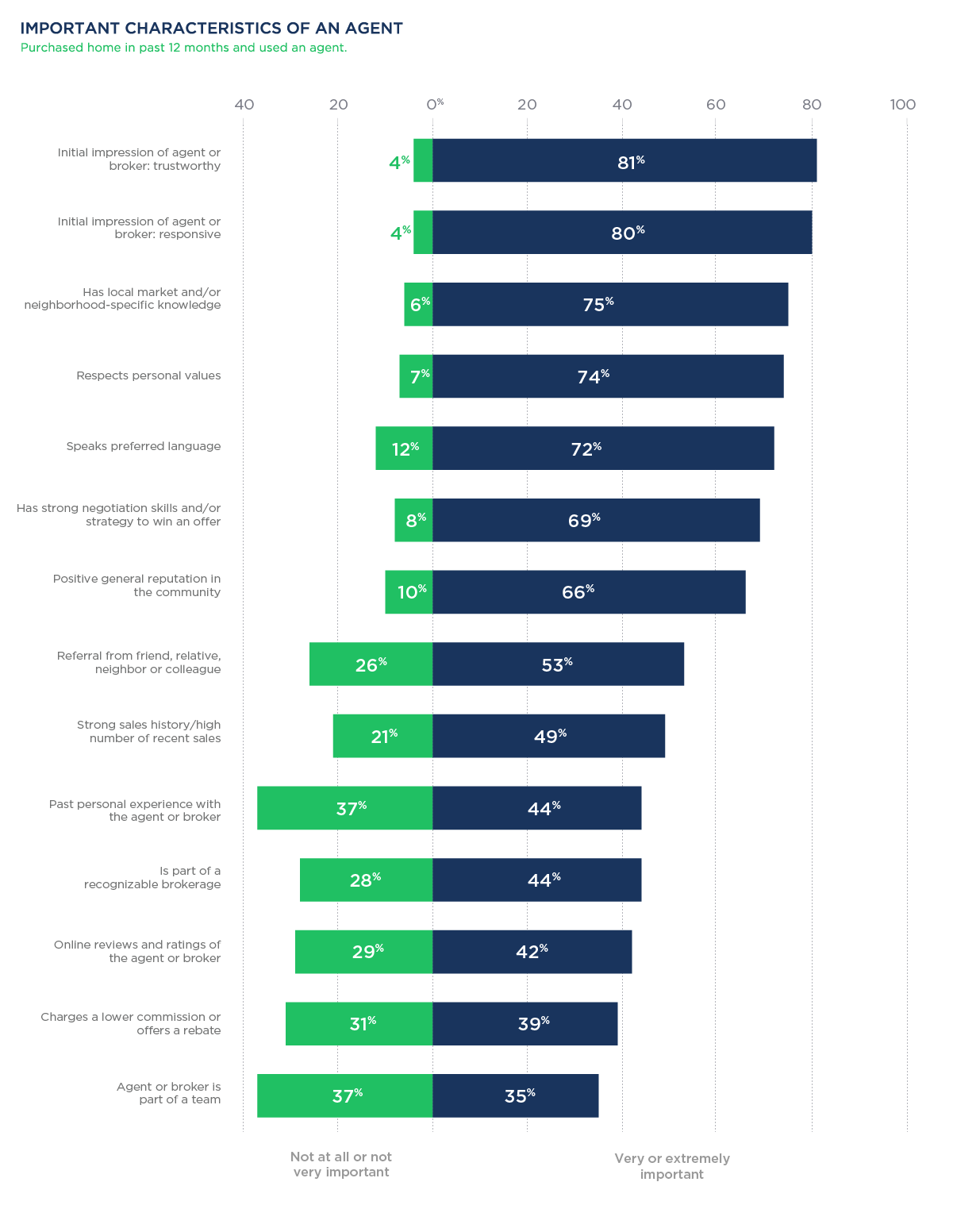8 min read
How to Be a Successful Real Estate Agent
Use these 10 tips to be successful in real estate by creating the foundation for a rewarding career.

Real estate agents don't become successful overnight. In fact, according to our director of industry outreach, Bret Calltharp, 80% of new real estate agents fail in their first two years — primarily because they lack an entrepreneurial mindset.
'Too many rush into life as an agent without learning the skill set needed for success and don't treat the profession like a job,” Calltharp says. “A solid business plan, eagerness to engage in training and coaching, and an accountability partner will help all new agents stay on track when they build their business.'
Use these 10 tips on how to be successful in real estate to create the foundation for a rewarding career.
- Create a business plan
- Segment your leads
- Establish a schedule
- Continue educating yourself
- Learn from experience
- Build a strong referral network
- Budget your expenses
- Put your clients’ needs first
- Build a strong online presence
- Establish effective means of communication
1. Create a real estate agent business plan
The real estate market is competitive and constantly changing. Success as a real estate agent hinges on many factors, but one of the most important is having a business plan that keeps you on track and holds you accountable. A good real estate business plan shows you:
- Where you are today
- Where you want to be
- How you'll get there
- How to measure your performance
- How to recognize when you need to make a course correction
2. Segment your leads
Many successful real estate agents segment leads in their customer relationship management (CRM) tool. By doing this, you'll have an organized pool of leads that can help you grow your business. Some popular ways to segment leads are by their neighborhood, their timeline for buying or selling, or when they purchased or sold their home. Effective segmentation allows you to:
- Send personalized email marketing and newsletter campaigns.
- Add to a re-engagement campaign.
- Reward referrals.
- Give gifts for special occasions or memorable events.
- Notify leads and clients of a new product offering.
- Follow up with tailored messages based on previous interactions.
As a Zillow Premier Agent, you can use the Premier Agent app to assign a status to your leads, develop a follow-up plan that's tailored to each contact type and set reminders to ensure you stay on track.
3. Establish a schedule (and stick to it)
Many people become real estate agents for the freedom to work when they choose. However, having a schedule — and sticking to it — is a common denominator among many of the most successful real estate agents.
A successful real estate agent's daily schedule typically consists of:
- Starting each day with a morning routine to get into the right mindset
- Scheduling time to achieve daily, weekly and monthly goals
- Prioritizing tasks, such as nurturing leads, that will propel their business forward
- Taking breaks to recharge
Many agents find it helpful to schedule their day in blocks to ensure they stay on track. A real estate agent's day might look like:
- 9-10 a.m. — Prospecting leads
- 11 a.m.-noon — Responding to and following up with leads
- 1-2 p.m. — Transaction paperwork
- 2-3 p.m. — Continuing education, business planning and accountability
- 3-5 p.m. — Showings, appointments and marketing
4. Continue educating yourself
Just when you think the coursework and exams are behind you, continuing education becomes necessary to stay relevant or, in many states, is mandatory to maintain your license. To be a successful real estate agent, you should:
- Keep up with the market and neighborhoods you serve.
- Stay informed about current mortgage rates.
- Stay up to date with changes to real estate laws and practices.
- Learn new technologies and tools to help you succeed.
Zillow gives agents access to in-depth training on our products, plus topics like how to build your personal brand and convert online leads. Consider creating a free agent profile with us to start building your brand online — Zillow operates the largest real estate network on the web, with the most unique visitors in the U.S.*
5. Learn from experience — yours and your colleagues’
Obtaining your real estate license is just the first step in your career. To become a successful real estate agent, you need to know more than simply how to close a sale. Steer clear of rookie mistakes with these real estate agent tips:
Know your brokerage. Get to know your colleagues and learn your brokerage's policies to avoid making costly errors.
Start training. If your brokerage offers training programs for sales and technology, make sure to take them.
Find a mentor. You'll be surrounded by successful real estate agents. Find one (or more) willing to share advice and best practices on how to be the best real estate agent — maybe they'll even let you co-list properties with them.
Volunteer. Gain experience by hosting open houses, photographing homes, managing paperwork, writing real estate descriptions, cold calling and listing homes for other agents.
Follow these tips and you'll be well on your way to becoming a successful real estate agent.
6. Build a strong referral network
To build your network, you should connect with other agents and prospective clients — and have a strategy to stay in touch with them. According to the Zillow Group Consumer Housing Trends Report 2018, referrals are one of the top three ways that sellers connect with agents (28% of an agent's clients come from referrals). And 27% of buyers also find their agent through referrals from family, colleagues or social connections.
To build a strong referral network, you should:
- Attend conferences and events with other agents.
- Go out of your way to provide exceptional service when working with clients.
- Ask for referrals directly.
- Carry business cards in case a contact wants to refer someone to you.
- Respond promptly to any communication.
- Give personalized real estate gifts to show that you value your clients.
7. Budget your expenses
Budgeting is crucial to being a successful real estate agent. You should anticipate earning no income for the first 60-90 days, which means you'll be paying for expenses out of pocket. A three-month reserve — for both personal and professional expenses — is ideal. On average, beginning real estate agents spend $2,000 to $3,000 the first year and typically sell one to three homes, earning less than $50,000 annually. Some of your major expenses may include:
Continuing education and training: This will vary, but you should expect to spend $100 to $500 per year or more, depending on the courses you decide to take.
Advertising and marketing: You'll likely spend between $100 and $500 each month for a website, social media ad campaigns, flyers, open house signs, newsletters and other marketing expenses.
Transportation: How close do you live to your office and the neighborhoods you serve? This will determine your fuel, insurance and vehicle maintenance costs. Some agents average $1,400 per year, but the type of vehicle you have — and your commute — may put you significantly over (or under) that figure.
Create a spreadsheet to plan for your business expenses and manage cash flow. Strongly consider opening a business bank account and obtaining a business credit card, which will help you separate personal and business expenses during tax season.
8. Put your clients' needs first
Real estate agents work with many people, including buyers, sellers, investors, appraisers, loan officers, mortgage brokers, inspectors and contractors — but a large part of knowing how to be a good real estate agent is engaging and communicating with your clients.
Important real estate agent characteristics for buyers
Almost three-quarters of buyers want an agent who respects their personal values (74%), speaks their preferred language (72%) and possesses strong negotiation skills (69%).

Important real estate agent characteristics for sellers
The top characteristics a seller wants in their agent are trustworthiness (86%), responsiveness (81%) and local market expertise (69%).

9. Build a strong online presence
One of the top qualities of a successful real estate agent is the ability to build a strong online presence. In fact, buyers who use online resources to find a home are significantly more likely to use an agent than those who don't use online resources (80% versus 52%) — and if they're looking for a home online, there's a good chance they'll find their agent online too. When it comes to selling, 63% of homeowners enlist the help of online resources.
Regularly updating your website and social media profiles — and regularly producing informative content — is a great way to help achieve success in real estate sales.
Build a website that appears in search results
- Use search engine optimization (SEO) techniques, or hire a professional to boost your website's ranking.
- Write informative, relevant guides and blog posts to demonstrate your real estate expertise.
- Provide multiple ways of getting in touch (we recommend phone, text and email).
- Include links to current listings.
- Display professional photographs and enticing virtual tours.
- Have clear calls to action (CTAs).
Develop a social media marketing strategy
- Create ads that target specific interests.
- Share market updates and listings.
- Engage with your connections.
- Link to shareable content like real estate newsletters, articles and blog posts.
Become a Zillow Premier Agent
Becoming a Zillow Premier Agent can help greatly increase your online presence by providing:
- Insight into which homes your clients have viewed, saved and searched for on Zillow
- Personalized text messages to clients through our Premier Agent app
- Easy lines of communication between you and your clients
- Customizable tasks, reminders, notes and mobile notifications
- Performance and investment tracking metrics and reporting tools
10. Establish effective means of communication
Some of the best real estate agent advice is to respond promptly to your clients. We found that 80% of buyers, and 81% of sellers, view this trait as extremely important.
You can use real estate scripts to connect and follow up with leads through:
Text messaging. This is becoming increasingly preferred by buyers and sellers. Text messaging can often get a quick response and can be used to prompt further communication over the phone.
Phone calls. Talking over the phone is a great way to show new clients that you're personable, and it’s crucial to setting up appointments and converting leads.
Email. Sending an email is often the preferred method of communication, as it provides your client with time to digest information and gives them a record they can refer to later. Many successful real estate agents use email to follow up with clients and leads.
Video messaging. This isn't common, but if your client prefers it then you should be ready and able to effectively communicate using video.
For more articles, tips and data on how to be a successful real estate agent, visit our Zillow Premier Agent homepage.
*Comscore Media Metrix® Multi-Platform Key Measures, Real Estate, Total Audience, April 2019, U.S.
Tips for top-performing listings
Backed by new research, this guide reveals what today’s top listings do differently to capture buyer attention and outperform the rest.
Learn more

